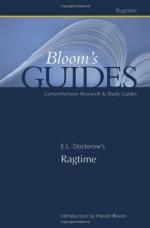|
This section contains 2,479 words (approx. 9 pages at 300 words per page) |

|
SOURCE: "Through a Glass Clearly: Vision as Structure in E. L. Doctorow's 'Willi'," in Studies in Short Fiction, Vol. 30, No. 3, Summer, 1993, pp. 337-42.
In the following essay, Miller provides a detailed analysis of "Willi," from Lives of the Poets, pointing out its psychological complexities.
In his significant work on Remembrance of Things Past, Roger Shattuck argues that three principles of vision clarify the division of Proust's book and constitute its most fundamental structure. Borrowing his terms from film, Shattuck names these principles cinematographic, montage, and stereoscopic. The young see through only one lens: their first experience of reality, Shattuck asserts, "is cinematographic and linear,… conveying a sense of cause and effect…. Subsequently, this secure sense of predictability is disrupted when we encounter contradictions and alterations in Nature and, above all, in people" (57). A second phase, corresponding to the montage principle, is roughly one of disenchantment and "makes one...
|
This section contains 2,479 words (approx. 9 pages at 300 words per page) |

|


